#I’m never beating the unfriendly allegations
Text
my resting bitch face must go crazy bc why has every person I have met told me that they thought I hated them when we first met😭
#I’m never beating the unfriendly allegations#I’m not angry at all I swear I’m just very nervous and uncomfortable 90% of the time
9 notes
·
View notes
Text
My Hero
Summary: After the truth of One for All is leaked out to the public, Deku faces a lot of unfriendly criticism. His boyfriend, Shoto is ready to get to the bottom of this scandal and cheer Izuku up.
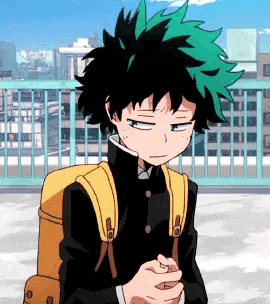
“The pro-hero Deku has been found to have been born quirkless. Weeks ago we received an anonymous tip that he had been given his quirk from none other than All Might himself. We at Hero newsroom were confused by the allegation at first, but it was confirmed by the villain All for One himself. Not only that, but Izuku Midoriya’s doctor and middle school teacher have both confirmed that he was quirkless before his time at UA.” The male newscaster announced on television.
“Well, that certainly is some big news. We have reached out to Midoriya’s mother as well as colleague Ground Zero. However, neither of them has decided to comment on the situation. The news has shaken the industry, many people have lost respect for Deku. Now, why do you think that is Takashi?” The female newscaster turned back to her colleague.
“It’s simple really, many feel like Deku doesn’t deserve the title as one of the top heroes when he got his quirk from the former symbol of peace. They feel like he cheated on his path to the top. Others feel like if such a transferable quirk did exist it should have gone to someone more capable-”
Izuku turned off the television not wanting to hear any more. It was all too much for him, the press, the backlash he received from his agency, and the amount of hate mail he’s been getting recently.
“You okay?” Shoto went over and took a seat by his boyfriend. They had been living together for just over a year now, and in all that time he’s never seen Izuku so deflated. He knew about the scandal that was going around and did not understand why it was that big of a deal. He found out about One for All soon after they started dating. Still, who cares if Izuku was given his quirk, he was still a great hero.
“As good as I can be.” Izuku sighed, “I don’t know what to do.” Shoto pulled him into a hug, he hated seeing Izuku drained of his spirit. He swore he would beat up whoever tipped the journalists about One for All.
“I can’t believe what these journalists are saying about you. It’s ridiculous, I know how strong you are Izuku. I watched you go from a boy who would always break his bones to the strongest person I’ve ever met. Whatever flack you’re getting, it’ll blow over I promise.” Shoto kissed his boyfriend on the head.
“Thanks, Shoto, I think I just need some time. I’m going to head to bed.” Izuku walked back into the bedroom, leaving Shoto alone on the couch. He knew despite what he told him, Izuku would still feel bad about the situation. If only All Might were still here, he could clear up this entire thing. It didn’t help that Shoto had a live TV interview the next morning. It’s not like he wanted to go, but it was a requirement of his agency to keep on the press’ good side. The public knew that Izuku and Shoto were dating, and his agency didn’t want him to get dragged down with the scandal. When he looked back over at the spot that Izuku occupied earlier, he noticed an envelope. He opened it cautiously. It read:
Dear Deku,
You are not a real hero, you are just some All Might wannabe. Even with his quirk, you are only half the hero he was. Do us all a favor and give your special “One for All” quirk to someone who can do something useful with it. After you do that, then just disappear. Better yet, why don’t you just go and kill yourself.
Shoto was ready to erupt into flames while reading the letter. He loved his boyfriend more than the entire world, and looking at this letter, he just wanted to burn it. Still, there was something suspicious about it, so he pocketed it and decided to go out to see a friend. Something was going on here. Shoto walked over to a small storefront sandwiched between an insurance office and a restaurant. There worked a friend of his agency, he went by the name Sike and had the gift of psychometry. He often aided detectives and hero agencies in finding villains.
“Well, isn’t it the pro-hero Shoto?” Despite his talent, he had a disturbing voice which always made Shoto uncomfortable.
“Just figure out who wrote this,” the bicolored boy handed the man the letter.
“Very well.” Sike touched the letter and a soft glow erupted from his fingers. “Worried about your boyfriend are we?” The pro hero glared at him. The glow continued to intensify until it burnt out completely.
“Well? Who wrote it?” Shoto asked impatiently.
“Some guy, looked pretty strange if you ask me, blue hair and some sort of hand fetish.”
“Hand Fetish? Shigaraki? That doesn’t make sense, he was arrested by Deku over two years ago.”
“And he escaped about two months ago. It wouldn’t surprise me if he was the one leaking the information about your boyfriend.” Sike pulled out a cigar, in this day and age, he was probably one of the only people to still smoke.
“Does that mean he wants to get rid of Deku? Is this his way of doing so?” he grabbed the letter from Sike angrily.
“Looks like it, I mean I thought Shigaraki was too dumb for psychological manipulation, but I’ve heard it’s done a number on your boyfriend. Doesn’t seem like he’s been going out much recently, has he?”
“I’m going to kill him,” Shoto said through gritted teeth.
“Calm down hero.” He smiled slyly, “Now for your payment.”
Shoto walked out of there quite ready to beat Shigaraki up. He thought that the League of Villains were finally passed them. When he got home he expected to find Izuku fast asleep, but instead, he was wide awake waiting for him in the living room.
“Where were you?” the green-haired boy asked worriedly as Shoto came in.
“This letter,” he pulled it out angrily, “was written by Shigaraki.”
“Shoto…”
“I swear I’m going to kill him.”
“Shoto…”
“Like what the hell, he probably was the one who leaked information about One for All in the first place. I swear-”
“Shoto I know! I went to Sike earlier.” The bicolored boy went quiet.
“What do you mean you went to Sike? I was just at his place and he never mentioned anything about you coming.”
“Well, you know that guy is in it for the money. Anyway, I’ve been trying to track Shigaraki down since he escaped and figured this whole thing was because of him,” explained Izuku. “I had Sike confirm it when I got the letter and I’m working on tracking him right now.”
“But earlier…you seemed so deflated at the news. I read the letter and I thought maybe you were thinking about…” Shoto struggled to say the rest of his sentence, losing Izuku was his biggest fear.
“Shoto,” Izuku pulled the taller boy in for an embrace, “I was sad that the public had to find out like this, but I would never even think of leaving you. I know I’m not All Might or the symbol of peace, but All Might sacrificed a lot for that title. I am just Deku, an ordinary pro-hero, but that’s okay because I have friends like Ururaka and Kachan, my mom and most importantly you.”
“I love you Izuku Midoriya,” said Shoto as he settled into the hug.
“I love you too.”
“So, what are you planning to do?” Despite what Izuku told him, Shoto was still worried.
“My agency told me to lay low for a little bit, so I’m not allowed on big rescues for a while. It’s going to be mostly petty criminals and paperwork. Behind the scenes, I’ll be tracking Shigaraki. If he thinks he crushed my spirits, he’ll be more careless and we’ll be able to catch him!” Izuku said excitedly.
“So you're okay with all this?”
“Despite what people say about me or my borrowed power, I’m going to still work on saving them because actions speak louder than words, right? I never became a hero for the praise, I became a hero so I can help people.” Shoto’s heart swelled at Izuku’s words. He wondered if it was humanly possible to love a person this much.
“So, my hero interview tomorrow. Will you be able to come?” Izuku looked at him puzzled. They tried to support each other as much as possible, but with their busy schedules, they didn’t have time to attend each other's interviews and public events. Moreover, it was frowned upon because the questions asked would often concern their relationship. Even if Izuku wanted to go, he couldn’t due to his agency’s policies.
“Unfortunately, I can’t due to agency restrictions,” Izuku watched Todoroki’s face fall, “but I’ll make sure to watch it on T.V.” Shoto gave him a soft smile and proceeded to pull him in for a kiss which caused Izuku to blush. It wasn’t like his boyfriend to normally be this affectionate.
The next day Shoto was preparing for his hero interview. He hated interviews, to him they were the worst formality about being a hero. Still, his agency insisted that he give one.
“Shoto, make sure you don’t mention anything about your boyfriend’s quirk-scandal, or anything about Deku at all.” urged his publicist. His agency wanted to get as far away from the scandal as possible. As he sat down with the interviewer on the stage, he felt a familiar sense of dread. Still, at least this time he had something he wanted to say.
Back at his agency, Deku had the T.V playing as he filled out paperwork. He knew Shoto hated interviews, but he oddly didn’t seem to hate this one as much.
“Now joining me is pro-hero Shoto, everyone give him a welcoming applause.” Izuku smiled at the screen. Shoto was a popular hero, which made him proud. The only time he would get jealous is when ladies would approach his boyfriend. The rest of the interview carried on as expected and the interviewer talked about Shoto as a pro-hero and recent villains he had defeated. That was until one question caught Izuku’s attention.
“So, I know that you and Deku have been in a relationship for quite a while now. What is your opinion on his quirk-scandal?” This earned a confused murmuring from the audience. There were certain subjects you didn’t touch on interviews like this and Izuku was sure Shoto’s publicist had talked to the interviewer beforehand.
“Well, that certainly has been a discussion in our household,” explained Shoto. When he looked back towards his publicist, he could see that she was a nervous wreck. He was going to have to apologize later for all of this. “That being said I think the public is blowing this all out of proportion. Yes, Deku’s quirk was not what he was born with, but All Might chose him for a reason. Let me tell you, he had to struggle with that quirk for a while. His body totally rejected it and he ended up with many broken bones, but even then he kept trying. He worked hard and made that quirk his own. Now, he is a very capable hero. I think he is the greatest hero Japan could ask for. All he wants to do is help people and even with people cursing his name every 5 minutes, he still wants to help them. That’s why he is my hero.”
“Well, that certainly is an interesting take on it.” said the interviewer. Shoto was happy, he hoped Izuku heard what he had said. He hoped the public realized how much of an amazing hero his boyfriend was.
Izuku’s eyes filled with tears, Shoto was defending him on live television. He knew Shoto was warned against it, but he still decided to address the public. He felt so lucky to have such a great boyfriend. “I love you Shoto Todoroki,” he muttered under his breath. Later that night, he would say the same thing to his boyfriend as they enjoyed each other's company well past midnight.
82 notes
·
View notes
Text
Russia Reacts to EU Sanctions
LOS ANGELES (OnlineColumnist.com), Dec. 22, 2020.--When Russian opposition leader Alexei Navalny was poisoned with Soviet-era banned chemical weapon Novichok Aug. 20 in the Tomsk, Siberia airport, all fingers pointed toward 68-year-old Russian President Vladimir Putin. Novichok was used two years before in Salisbury, England, poisoning former KGB operative Sergei Skripal March 4, 2018 and his daughter Yulia. So Putin lost his plausible deniability with typical Kremlin denials, claiming they had no idea what happened. Novichok is a banned chemical weapon under the 1997 Chemical Weapons Convention of which the Russian Federation was a signatory. Two unexplained Novichok poisonings in two years was enough for the European Union, slapping Moscow Oct. 15 with sanctions of six high-ranking Kremlin officials, including Federal Security Service [FSB] Director Aleksander Bortnikov and five members of Russia’s Defense Ministry.
EU officials generally turn the blind eye on Russian malfeasance because of their dependent relationship with Gasprom, Russia’s main energy supplier to the 27-member economic block. EU officials sanctioned Russia’s Scientific Research Institute for Organic Chemistry and Technology, responsible for “the destruction of chemical weapons stocks inherited from the Soviet Union.” When Navalny’s Novichok poisoning was corroborated by EU laboratories, it was a matter of time before they slapped the Kremlin with sanctions. “The use of chemical weapons constitutes a serious breach of international law,” said the European Council Oct. 15. European Council President Ursula Von Der Leyen said that Navalny’s poisoning must have the approval of Putin, prompting the EU sanctions. President Donald Trump, 74, did not follow up with any U.S. sanctions against Moscow.
Russia called EU sanctions “unacceptable” because Putin insists that no one in his government tried to poison Navalny. Putin said Dec. 17 at his yearend press conference that if he wanted to “finish off” Navalny, he would have Aug. 20, denying that he had anything to do with Navalny’s Novichok poisoning. Were it not for an emergency flight from Tomsk to Berlin for lifesaving treatment, Navalny wouldn’t be around. “:I assert that Putin was behind the crime, and I have no other explanation for what happened. I’m not saying this out of self-flattery, but based on the facts. The most important fact is Novichok,” Navalny told German’s Der Spiegel. Laboratories in Germany, France and Sweden confirmed the presence of Novickok, a banned chemical weapon only available to the Russian Federation. Putin likes to attribute these events to rogue elements or theft of Russia’s banned chemicals.
Hitting the EU back with his own sanctions, Putin played offense, knowing that he holds the cards when it comes to the EU’s dependence on Russian energy. Banning key EU officials for Russia, Putin hopes to send Brussels a message that they can’t mess with the Russian Federation. “In these circumstances, it is reasonable to conclude that the poisoning of Alexei Navalny was only possible with the consent of the Presidential Executive Office,” said the EU. Putin went one step more sanctioning EU officials, he actually ousted them from the Russian Federation. Putin called on senior diplomats from Germany, Sweden and France to notify their embassies that they must leave the Russian Federation at the earliest possible time. “We will continue to respond appropriately to unfriendly actions by western countries,” said the Russian Foreign Ministry on its Wesbsite.
Russia’s foreign ministry follows Putin’s lead very carefully, especially when it comes to responding to EU sanctions. Putin remembers well Dec. 31, 2016 when former President Barack Obama ousted 35 Russian diplomats from Washington, pushing U.S.-Russian relations to post-Cold War lows. Obama claimed that Putin meddled in the 2016 presidential election, handing the election to Trump. It was easy to blame Moscow when the real meddling happened at the Obama White House, Department of Justice, FBI, CIA and National Security Agency [NSA], working cryptically to prevent Trump from the presidency. When that backfired Nov. 8, 2016 with Trump beating Hillary, U.S. government agencies spent the better part of Trump’s presidency trying to remove him from office. Trump never bought the Democrat narrative that the Kremlin influenced the 2016 presidential election results.
Biden’s incoming administration promises to further deteriorate U.S.-Russian relations, with Biden promising more economic sanctions on Russia’s alleged hack of U.S. government agencies. Biden was part of Obama historic bad relations with Russia, based in large part on former Secretary of State Hillary Rodham Clinton’s bogus “dossier” that made wild accusations against Trump. Democrats never accepted Trump’s presidency, working day-and-night to see him removed from office. Before the Nov. 3 vote, Democrats claimed that Putin was still meddling in U.S. elections, like he did in 2016. After the election, when Biden won, Democrats stopped talking about Russian meddling, now that their candidate won. Whatever happened with Navalny or more recently the hack of SolarWinds network management software, Biden looks to turn back the clock and U.S.-Russian relations.
About the Author
John M. Curtis writes politically neutral commentary analyzing spin in national and global news. He’s editor of OnlineColumnist.com and author of Dodging The Bullet and Operation Charisma. Reply Reply All Forward
0 notes
Photo

The public swallowed a story of the wayward president’s son who cleaned up his act to take his place in the White House. Kitty Kelley exposes what really lurks in George W Bush’s past
On November 6, 1997, the exclusive club of America’s current and former presidents and first ladies gathered at a college campus in Texas for a celebration. President and Mrs Clinton arrived on Air Force One to join President and Mrs Ford, President and Mrs Carter, Nancy Reagan and Lady Bird Johnson.
They were there to honour President George Bush, who had raised $83m to build his presidential library at Texas A&M University.
His eldest son, George W Bush, governor of Texas, welcomed the 20,000 guests. With a few words, W smashed the bonhomie of the occasion: “I’m here to praise my father as a man who entered the political arena and left with his integrity intact . . . A war hero, a loving husband . . . and a president who brought dignity and character and honour to the White House.”
Spoken at the height of Clinton’s personal scandal in front of a predominantly Republican crowd, the assault on the current president’s integrity was not lost on anyone.
The Bush family had never accepted Clinton as a worthy successor, and they delighted in his unfolding scandal. They e-mailed one another ribald jokes about Monica Lewinsky and Paula Jones’s sexual harassment suit against Clinton.
When it was reported that Jones claimed she could identify a “distinguishing characteristic” of Clinton’s anatomy, George Sr did not rest until he discovered what she was talking about. He then e-mailed his sons and friends: “His Johnson curves to the left.”
The family was looking towards its restoration to power through the presidential candidacy of George W. His mother, Barbara Bush, referred to him as “the Chosen One”. There was a problem, however. After eight years of Clinton, the American public “want to elect a statue”, as Oklahoma’s Republican governor Frank Keating put it. “They want a hero, an unblemished and untarnished guy in the White House.”
Karl Rove, the political adviser with the task of shaping W’s image, knew he had to present his candidate as the anti-Clinton: fresh (no drugs, no alcoholism), religious (acceptable to evangelicals) and faithful to his wife (majority of voters: women).
Fanning out across the country, Rove and the Bush team began to tidy up the governor’s past. Rove wanted no potentially devastating revelations to emerge that might portray W and Laura, his wife, as anything but an ideal and idealised couple. But to present W as pure and pristine was hypocritical and untrue.
George W Bush wasn’t Bill Clinton, certainly not in terms of sexual excess. But Clinton is not the standard to which he should be held. He must be compared with his own declarations on morality and his own carefully crafted public image — the image that the entire Bush family has cultivated for so long.
THE first hurdle facing the tidy-up team was to deal with W’s past drug use. As governor of Texas, he took a hard line on drugs. He supported increased penalties for possession and signed legislation mandating jail time for people caught with less than a single gram of cocaine.
Yet, as the claims of Sharon Bush, his sister-in-law, show, he could have been subject to jail time himself had he been caught “doing coke” with his brother Marvin at Camp David during his father’s presidency.
In the midst of an unfriendly divorce from Neil, another of the Bush brothers, Sharon told me last year: “He and Marvin did coke at Camp David when their father was president and not just once, either.”
As governor, George W had been very careful not to lie about doing illegal drugs himself, because he knew there were too many people who could testify to the truth. “When I was young and irresponsible,” he would say, “I was young and irresponsible.”
So what was his drugs record? When they were young, both he and Laura used to go down to the island of Tortola in the British Virgin Islands where they attended and enjoyed heavy pot-smoking parties. Smoking pot was hardly a sin but it did not mesh with the strait-laced image the Bushes were now presenting to the voters.
Then there were the allegations about cocaine. When W was at Yale in the mid-1960s, it was the most popular drug on campus. One contemporary, who insists on remaining anonymous, admitted years later to selling cocaine to W at the university.
Another man who was at Yale’s graduate school recalled “doing coke” with George, but he would not allow his recollections to be used on the record. This was not simply through fear of retribution. He said he did not feel right about “blowing George’s cover because I was doing the same thing”. A confirmed Democrat, he also said that although he could not stand George’s Republican politics, he liked him as a person.
Alcohol, the more familiar thread in W’s life story, started at Andover, the exclusive school W attended.
Andover stressed athletics as part of its regimen. Unable to live up to his father’s legacy as one of Andover’s most outstanding athletes, George W played his own kind of sports and won a reputation as a prankster.
“He loved stickball, which is baseball played with a broomstick and a tennis ball and funny hats,” recalled his contemporary, J Milburn “Kim” Jessup. “George made himself the high commissioner of stickball, which was a joke job.”
Alcohol was absolutely forbidden on or off campus, but the high commissioner of stickball figured out a way to beat the system. He designed an official stickball membership card that seemed to carry the imprimatur of Andover. He distributed the cards as fake IDs.
“People took the cards and started slipping off campus to go to Boston so they could get drunk,” said Jessup.
When W moved on to Yale at 18, with the Vietnam war at its height, he felt alienated on the liberal campus because of his father’s conservative politics and his own Texan childhood.
“George was definitely not on the popular side of the war issue, but he stood his ground,” said Robert Dieter, his Yale roommate. “Saying someone was conservative back then almost had a moral sting. I remember him coming back to the room and telling me that someone had been in his face about his father’s position. There was a certain arrogance that the left conveyed back then. It was hurtful.”
As a result, George spent most of his time carousing at the Delta Kappa Epsilon (DKE) fraternity house or “the drinking jock house”, as it was known. Some classmates remember him as a “hard-drinking good-time guy” and “a jock sniffer” who “loved to raise hell”.
Ken White, a DKE contemporary, told me: “My wife remembers him roaring drunk one night at a DKE party without a date doing the Alligator; that was some sort of dance back then when you fell to the floor on all fours and started rolling around.”
In the spring of 1972, after graduating from Yale and while serving part-time in the Texas Air National Guard, George W embarked on what he would later describe as his “nomadic years”. Seeing him adrift, his father got him a job with the Republican campaign in a Senate race in Alabama.
Those who worked with George at that time remember him as an affable social drinker who acted much younger than his 26 years. They recall that he liked to drink beer and Jim Beam whiskey at the Cloverdale Grill in Birmingham, Alabama. They also say he liked to sneak out the back for a joint of marijuana or into the bathroom for a line of cocaine.
According to their recollections, he tended to show up for work “around noon”, prop his cowboy boots on a desk and start bragging about how much he had drunk the night before.
Spending Christmas in Washington with his parents, W went out drinking with 16-year-old Marvin. Driving home, he smashed into several dustbins. He swaggered into the house with the bravado of someone who had drunk too much, and there was his father, sober and unsmiling.
“You want to go mano a mano right here?” George junior challenged.
Big George called John White, a former footballer with the Houston Oilers. Bush wanted his son to perform community service with a mentoring programme for inner-city youth started by White and his teammate Ernie “Big Cat” Ladd.
Young George reported for work in January 1973 at a warehouse in a tough district where kids up to 17 years of age were offered sports, crafts, field trips, free snacks, rap sessions, tutoring for those who had been expelled, and big-name mentors from the athletic, entertainment, business, and political worlds.
Ladd recalled young George as “a super, super guy . . . If he was a stinker, I’d say he was a stinker. But everybody loved him so much. He had a way with people . . . They didn’t want him to leave.”
W stayed only seven months before he was accepted at Harvard Business School — a more hostile environment. It was the height of Watergate and his father was running the Republican National Committee for Richard Nixon, who was considered the Antichrist at Harvard. In Cambridge, Massachusetts, the town that surrounded the college, only 400 people were registered Republicans.
“I remember seeing Georgie at the Harvard Business School,” said Torbert Macdonald, an old classmate from Andover, “but he looked so lost and forlorn I didn’t have the heart to say hello.”
Others were less sympathetic. “I can still see him in his cowboy boots and leather flight jacket walking into macroeconomics,” recalled a classmate. “He sat in the back of the class, chewing tobacco and spitting it into a dirty paper cup . . . He was one red-assed Texan who made sure he was in your Yankee face and up your New England nose.”
Most of his contemporaries at the business school headed for Wall Street after graduation but W moved back to Midland, his boyhood home town in Texas, trying to become an oilman. He lived above a garage in an apartment that was piled high with dirty clothes that his friends’ wives periodically washed. Most of his nights were spent in bars, drinking with buddies in the oil business.
In July 1977, soon after his 31st birthday, friends introduced him to his polar opposite, Laura Welch. “We were the only two people among our friends who had not yet married,” she later joked.
Nobody expected the introduction to ignite, but George and Laura were married within three months at the First United Methodist Church in Midland.
Laura, the only child of a Midland builder, is remembered by some former students at Southern Methodist University in Dallas for not being as conservative as most. She had smoked marijuana and backpacked through Europe after graduation. A Democrat, she had also supported the anti-war candidate, Senator Eugene McCarthy, for the presidency in 1968.
In the early years of their marriage Laura joined her husband in his revels. “George and Laura ran in a much faster and fancier crowd than we did — their friends were all hard-drinking and drugging. That was part of the oil business scene then,” said Robert Whitt, a Midland lawyer.
But after a hard struggle to conceive and a fragile pregnancy with twins, Laura pulled back from the hellraising while he charged on, leaving her behind.
“I suppose there were strains in her marriage, just because he’s so difficult and high-energy and . . . she isn’t, but she never talked about it . . . Just read paperbacks and smoked cigarettes,” said Sharon Bush.
The couple kept their distance from the Bush family for several years in the 1980s, staying in Midland and even skipping the big surprise party that George Sr — by then vice-president of the United States — threw for his wife on their 41st wedding anniversary. “It’s a long way,” Barbara said, “and too expensive.” But family members confirmed that she had stopped speaking to her son, whose drunken outbursts had become a source of unending embarrassment to his wife and parents. The last eruption at a family gathering had been a tactless crack to the wife of one of his parents’ friends at her 50th birthday party: “So, what’s sex like after 50, anyway?”
He was 40 by the time he gave up tobacco, alcohol and drugs in 1986 and became a born-again Christian. In his memoir, A Charge to Keep, W credited his family’s good friend, the Reverend Billy Graham, with planting “a mustard seed in my soul”. He did not mention that he actually came to Jesus in a coffee house conversion with a much more flamboyant evangelist, Arthur Blessitt, who was known among born-agains as the man who had wheeled a 96lb cross of Jesus into 60 countries on six continents, winning a place in the Guinness Book of Records.
W figured, perhaps, that Graham was more palatable to churchgoing voters than Blessitt, who came to Midland after the bottom dropped out of the oil boom and fortunes crashed overnight. In a desperate effort to rescue lives and restore morale, some church elders invited the evangelist to stage a revival in the town. Loudspeakers exhorted the populace “to experience the love of God, the grace of the Lord Jesus Christ, and the fellowship of the holy spirit”.
George, who had already begun attending a men’s Bible class, asked a friend to arrange a meeting at a hotel coffee shop. As Blessitt recalled, George began with a few pleasantries, and then plunged in: “I want to talk to you about how to know Jesus Christ and how to follow Him.”
“I was quite shocked at his direct and sincere approach,” said Blessitt. “I slowly leaned forward and lifted the Bible that was in my hand and asked him about his relationship with the Lord: ‘If you died this moment do you have the assurance you would go to heaven?’” “No.”
“Then let me explain to you how you can have that assurance and know for sure that you are saved.”
“I’d like that.”
The evangelist read from the Book of Romans. He quoted Mark, John and Luke to the vice-president’s son, who held hands, repented his sins, and proclaimed Jesus Christ as his saviour.
Conversion and abstinence did not affect W’s machismo, however. He still swaggered and cursed constantly. When a friend accused him of taking the Lord’s name in vain, George exploded: “That’s bullshit. Total bullshit.”
Whether talking to reporters, congressmen, or heads of state, George made no effort to curb his trash mouth. Israel’s prime minister Ariel Sharon was taken aback to hear, “I said you were a man of peace. I want you to know I took immense crap for that.”
Those closest to George agreed that the key to his new persona lay in his steely discipline. His sister Doro described him as a fat boy who deprived himself to stay thin. His mother depicted a drinker who denied himself to stay dry. Both acknowledged that the effort to control these appetites was monumental.
In order to maintain his rigid discipline, George imposed an inflexible order on his life. Like any addict in recovery, he needed a regular schedule, rising early and retiring early. He prayed daily from his One-Year Bible, which was divided into 365 readings, each from the New Testament, the Old Testament, Psalms and Proverbs.
Edgy and impatient, he exercised at least one hour, sometimes two hours, a day. With martinet punctuality, he started and ended meetings exactly on time. The routine became the core of his developing political career, first as governor of Texas and then as president.
He refused to read memos longer than two pages. He thrived on making quick decisions. His religiosity allowed him to live in a black-and-white world of absolutes with no bedevilling in-betweens. His decisiveness sprang from his need to control and to establish order amid chaos. Once he made a decision, he rarely looked back.
Despite his quick temper, he was capable of nice gestures, as he showed on the presidential trail. Ruth Gilson, an estate agent, recalled a touching moment during a $1,000-a-head fundraiser in a Washington hotel in 1999.
She was one of very few women to attend the event. “All the men looked to be lobbyists in expensive suits with huge stomachs. The room filled up fast and we were all squished together. I was at the front of the rope line. A little old lady about 85 years old crept in beside me. She said she needed to see the governor. ‘I just have to talk to him,’ she said.”
The elderly woman was frail and wearing clothes that looked worn and dated. “She looked like a church lady from the 1950s.”
George W arrived and started working the crowd. The old lady stepped forward and asked if she could say something.
He reached out and took her hand. She whispered in his ear to please do something about the price of prescription drugs for the elderly.
He nodded. “I’ll try,” he said. Then he stepped back to look at her. “Did you pay $1,000 to come here?” “Yes, sir, I did.”
“Well, I want you to get your money back.” He turned to the man with him. “Get her name and address and see that she gets a cheque for $1,000.”
The little old lady shook her head. “No, I want you to have it all, Mr Bush. I want you to win.”
“Well,” said George. “I’ll tell you what. I’ll keep $100 and you keep $900 and we’ll both win. That’s what we’ll do.”
She smiled gratefully.
“It was such a sweet gesture on his part,” recalled Gilson. “Others might have seen it as patronising, but I didn’t. In a crowd of fat-cat lobbyists that little woman in her tattered coat looked like someone’s poor grandmother, and he responded sensitively.”
Extracted from The Family: The Real Story of the Bush Dynasty by Kitty Kelley.
Refs HOME Cocaine Resources president-bush.com When Is It Best to Take Crack Cocaine? Bush Tars Drug Takers With Aiding Terrorists
0 notes
Text
Horn O’ NotEnough

Last month, my annual Halloween-themed edition of “Eichy Says” focused on how the U.S. economy could generate our own independent source of cocoa production – in the face of climate change and future trade wars (where limited resources drive up costs).
So, on this Thanksgiving Day, I’m going to apply a similar recipe to the futuristic production of pumpkins and gourds. After all, depending on how erratic our planet’s weather patterns become, maintaining a constant supply of these decorative (and edible!) members of the squash family might also prove to be a tall order.
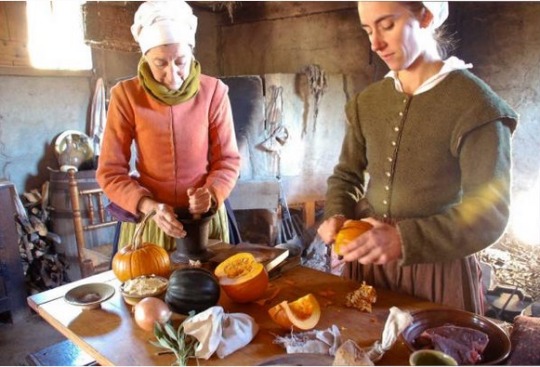
Pumpkins are especially unique in that they require tons of water, sunlight, and space for their lengthy vines to grow. When pilgrims first arrived in North America and observed the growing techniques of native tribes, there was obviously plentiful soil and acreage for those various pumpkins and gourds to receive their wiggle room leading up to each harvest.
But the reality is that Earth has warmed in the centuries since then. Human activity (e.g. pollution) has been the major driver of these. Even if we begin to gradually reverse the effects of climate change – or mitigate them, to slow down global warming – our reality is that such sizable crops may present greater challenges for farmers as the relevant outdoor growing conditions weaken.

Of course, naysayers will always be out in full force whenever new growing techniques are proposed. Their concerns are understandable: seeing how a good 95% of America’s farmers grow their crops through traditional outdoor farming, it isn’t a seamless process to transition away from that. So it means any such transition would need to be facilitated based on what we already know...and what we need to make happen, if this transition is going to play out over the next few decades.
Chris Bond of Maximum Yield magazine currently prefers lettuce and herbs for achieving one’s greatest hydroponic yield. On the other hand, he doesn’t recommend greenhouse usage for growing plants with deep roots – such as rutabaga, turnips, onions, garlic, and carrots. Obviously, pumpkins and squash would definitely fall into this category (for exclusion).

Bond says that the modern economic benefits simply aren’t there for squash, nut trees, corn, melons, oranges, apples, and lemons since the space requirements to effectively mass-produce them won’t create significant yield (and, he adds, radishes are a niche market, in terms of produce sales). He points to how tomatoes, peas, hops, pole beans, and watercress all need trellises for their vines...yet another circumstance which requires a lot of space, even though they are hydroponically-feasible (in theory) to harvest.
Robin Nichols of Garden & Greenhouse magazine recommends strawberries, potatoes, lettuce, cabbage, bush-style green beans, and fresh herbs (i.e. mint and basil) for greenhouse production. Yet, she disagrees with Bond’s skepticism when it comes to growing tomatoes in this type environment. Tomatoes, she maintains, can grow quite productively in a greenhouse if the grower knows what they are doing in terms of the science behind it.

Nichols agrees that the inevitable larger space considerations make it challenging to grow pumpkins and other flowering plants indoors. Those crops normally require bees to pollinate them, and hand-pollinating them within a greenhouse can be labor-intensive. She encourages experimentation with different types of greenhouse crops amongst individual harvesters; but she cautions growers against getting one’s hopes up for miracles – keep your expectations realistic!
Canada’s Northern Farm Training Institute (NFTI) is perhaps one of the harshest critics of greenhouse-style indoor crop production. The NFTI defines “food security” in terms of survival and basic health; it criticizes many growers’ obsessions with hydroponics, aquaponics, and year-round greenhouses by maintaining:
The vast majority of these systems produce only vegetables, and especially low-calorie vegetables like lettuce, kale, chard, spinach, herbs, etc. Human beings cannot survive on these types of foods, which is why these projects do NOT provide food security.

Here, the NFTI is making a “false dilemma” straw man argument. NFTI leaders are saying that people benefit from a diverse diet: grains, tree crops, dairy products, and animal proteins (from meat) in addition to fruits and vegetables.
True.
They go on to cite how, throughout agricultural history, root crops have worked best when cultivated with outdoor soil. Growing root crops indoors presently comes at high commercial expense, is energy-inefficient, and requires large infrastructural space.
Also true.
So, says the NFTI, sticking with traditional outdoor growing methods for root vegetables and tree fruits is cheaper, easier, widely-scalable, and energy independent. Their website also proceeds to recommend animal foods sources for a hearty North Canadian diet (even though many environmentalists will allege that vegetarianism and/or veganism are among the best human actions that can improve global environmental conditions). Yet, on this same webpage, the NFTI also acknowledges how indoor growing techniques “can be profitable farm business and create jobs” but they “must have access to a market of customers who want leafy greens and who can afford to buy them on a regular basis.”
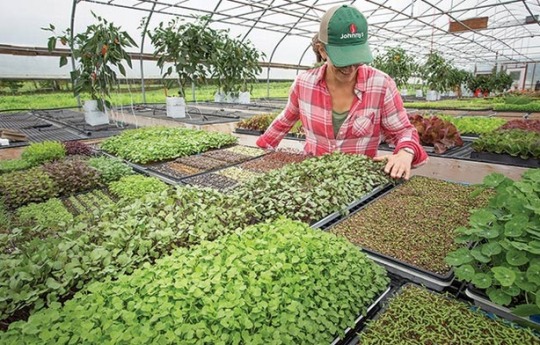
Thus, the NFTI is creating a dichotomy that doesn’t necessarily exist. They are claiming that, since costs have been so high and space-consuming for indoor agriculture up to this point, we shouldn’t be exploring it on a wider scale. What they are ignoring is the reality that we can still continue to support traditional outdoor farming in the interim – while moving toward new future innovations
This will most certainly involve a great deal of time, money, and investments. We must be willing to devote energy to refining those innovations. But if we never begin that process in the first place, we’ll be left with an environmentally-UNfriendly scenario where our access to wide varieties of fruits/vegetables becomes severely limited (or nonexistent, altogether).
If we put tremendous energy into actual diverse agrarian innovations – how long before it might be profitable to grow Indian corn within a greenhouse enclosure?

Let’s look at some examples where autumn root vegetables have been successfully grown under very unconventional circumstances.
Back in 2014, Graeff Phillips of Manchester, Maryland grew a 641-pumpkin hydroponically. He initially grew their roots in water to make the nutrients evenly benefit his pumpkin’s growth, since the pH can be controlled when growth is self-contained. In order to sprout these roots, he used Dill’s Atlantic Giant as his seed selection.
By the summer of that year, Phillips found that his experimental pumpkin was growing as much as thirty pounds per day while consuming 20-30 gallons of water, daily, at peak hotness. Because he transferred the hydroponically-grown roots outdoors, Phillips also had to monitor it closely to check for pestilence, water pump fissures, and new measurements of the pumpkin’s surface itself. Additionally, he acknowledges that luck was certainly a factor during that particular harvest season.
Yet, he made it happen.

Three years later, Dave Iles of North Pole, Alaska (a suburb of Fairbanks) grew a 1,232-pound pumpkin. He agrees with the assessment made by Phillips regarding luck as a factor. Aside from that, Iles recognizes how individual crops have differing genetics – as only one of his pumpkins and one of his squash survived during that 2017 harvest season, when each had started off from just one seed. However, he likes the fact that hydroponics gives a farmer more control over the hydration and nutrients applied.
Mark Clementz of Michigan uses the Advanced Nutrients line of fertilizers and supplements to grow giant vegetables hydroponically. Clementz is a member of an entire farming subculture that strives to harvest gigantic variations of fruits and vegetables. His biggest pumpkin has weighed in at 1,479 pounds; but he has also grown a 222-pound watermelon and a four-pound tomato.
Eventually, Clementz got his friend, Chris Kent, similarly hooked on this farming technique. Kent has found that Advanced Nutrients products help him overcome the geographic barriers of noticeable cooler temperatures, limited sunlight, and excessive rainfall. He even beat Clementz’s record for watermelon-growing, as Kent spawned one that ballooned to 291 pounds...and he received an invitation to appear with it on The Late Show with David Letterman.

Although these incidents may seem anecdotal (and, to an extent, they are), they still beg the question: why isn’t there a greater legislative push to explore agri-science in a manner that could make it feasible to “scale up” these sorts of techniques for mass production? It would require a spacious and controlled environment, of course. But if we don’t aim for a bigger goal, we’ll never achieve those smaller transitional changes.
Chris Jefferson of Rosebud magazine advocates for the harvesting of squash indoors via greenhouse technology. He cites a warm temperature (approximately 75 degrees) and an abundant light source (14 hours daily) in order to facilitate these indoor harvests.

Jefferson stresses the need for structural supports to accommodate the growth of squash vines. Every two days, the roots (planted in a peat-vermiculite mixture) will need to be irrigated to maintain their moistness. He also recommends horizontal wiring to anchor each individual plant (which can be finished off with something as simple as twist-ties). This wiring technique will maximize one’s usage of greenhouse space and allow leaves to receive a more even exposure to light.
Jeff Sanders of HomeHydroSystems.com is a proponent of greenhouse atmospheres for growing cucumbers, tomatoes, squash, peppers, and melons. However, he still emphasizes the importance of scientifically-proven conditions.
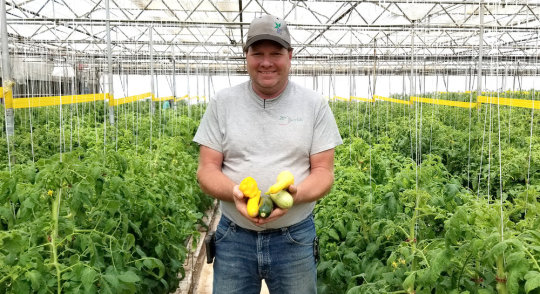
For example, when growing root crops, the facility’s temperature should never drop below 65 degrees or rise above 80 degrees during a 24-hour period. An optimal water temperature would be within the 68-72 degree range. When the water temperature rises above 80 degrees, heat stress sets in; at 85 degrees, the flowering process ceases as a plant goes into survival mode. The humidity range, on the other hand, should fall within the 70% to 90% range (ideally 80%-85%).
Additionally, adequate air circulation (to avoid a buildup of moisture) is essential to protect one’s plant from diseases and fungal spores. Your water supply should be estimated at 2.5-5.0 gallons per plant, fed to them in short-and-frequent cycles. The water itself should be replenished, from time to time, so that its freshness and nutrient levels remain consistent.

A final environmental reality is how letting pumpkins rot in landfills contributes to methane gas emissions. This year, City Farm of Chicago has raised awareness of this reality by offering special composting sites for residents to dispose of their post-Halloween or post-Thanksgiving pumpkins. Some of the gimmicks employed to grab people’s attention include the novelty experiences of allowing disposers to “smash” or “catapault” the pumpkins themselves into a designated site – making the resource more “fun” or festive.
Illinois also happens to be the top pumpkin-producing state. A pumpkin’s nutrients are beneficial to the soil when composted properly. And, regardless of where one lives (or farms), you don’t even need a special event to utilize this opportunity. People can compost their pumpkins and squash right in their own backyards...alongside other organic “throwaway” substances such as eggshells and coffee grounds.
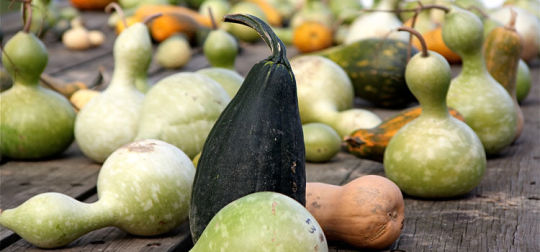
Pumpkins, squash, gourds, and even Indian corn are ornamental crops that can easily be taken for granted by any of us. But there’s no reason we have to continue to take them for granted. By supporting stronger economic incentives and infrastructural advancements for agricultural sustainability – we can continue to enjoy this seasonal crop diversity, as part of the American experience, for many centuries to come.
0 notes